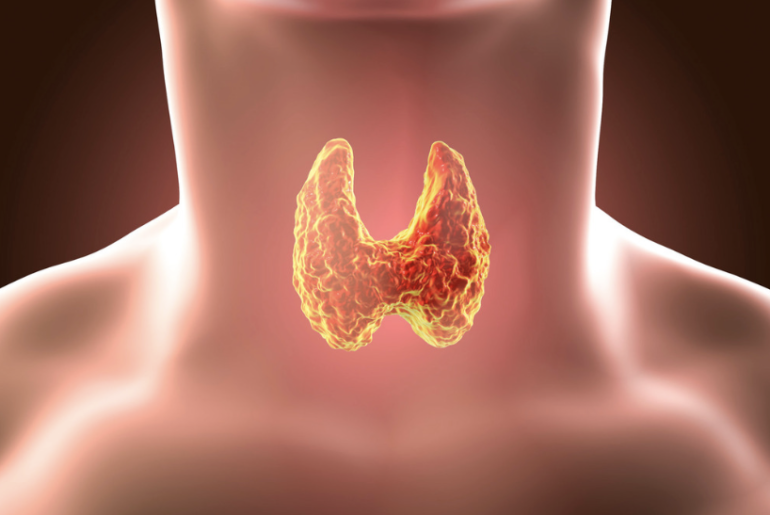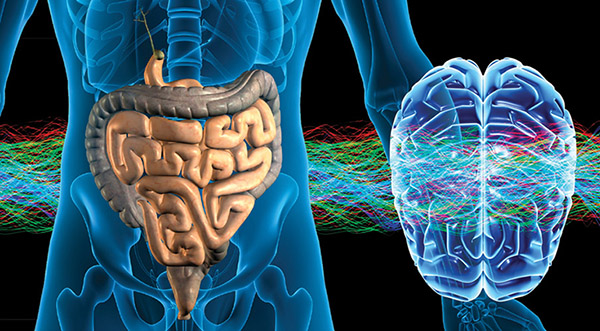- What is the thyroid?
The thyroid is called the master gland of the body. It is the largest of the 7 endocrine glands in the body and is located at the base of the neck.
- Functions of the thyroid gland
First of all, it controls the rate of energy production and progesterone receptor sites. It affects bone mass and controls cholesterol. This gland regulates body temperature. It plays a role in phase II liver detoxification and red blood cell production and reduces gastrin production, which leads to hypochlorhydria. In children, controls the growth rate. It is a gland that influences the activity of neurotransmitters, gastrointestinal transit time. Finally, it participates in thermoregulation and contributes to hot flashes.
- How does the thyroid perform its functions?
The thyroid produces the hormones T4 (93%) and T3 (7%) mainly, (but also T2, T7). T4 must be converted to T3. This conversion is mainly done in the liver and requires selenium. T4 and T3 circulate in almost all cells of the body. Thyroid hormones deliver specific messages to organs and cells, and thus control their functions. For various reasons, the body may have difficulty converting T4 to active T3.
- What affects thyroid function?
There are different reasons. Environmental toxicity: pesticides, insecticides, chlorine, fluoride, mercury, lead, aluminum. Radiation: cancer treatments, but also X-rays (dental, lung, and airport security machines). Also, estrogenic peaks: either naturally produced by the body or by exogenous sources such as plastics. When you eat estrogenic foods: soy, raw cruciferous vegetables, low animal protein diets, hydrogenated or trans oils, rancid oils. It is also possible that it is gluten intolerance: There is a frequent correlation between gluten intolerance and Hashimoto’s disease. Blood sugar irregularities: Very common stressors contributing to gastrointestinal dysfunction and thyroid problems. Finally, vitamin D deficiency, infections and inflammation of the intestinal wall: common causes of thyroid disease but also stress.
- Diseases of the thyroid
- Hyperthyroidism: Excessive production of hormones: Graves’ disease or Hashimoto’s disease, 2 autoimmune diseases with opposite effects.
- Hypothyroidism: Deficiency of thyroid hormones; very common and not well recognized unless symptoms are severe; most hypothyroidism is due to Hashimoto’s disease.
- Thyroiditis: inflammation of the thyroid gland due to a virus or bacteria, sometimes due to medication, or shocks to the throat, and also during pregnancy.
- Nodules: present in cases of hyper or hypothyroidism; mostly benign.
- Goiter: often composed of several nodules; lack of iodine can cause goiter as well as an increase in TSH (Thyroid Stimulating Hormone). The goiter develops over many years.
- Thyroid cancer: usually develops very slowly.
- Symptoms of thyroid dysfunction:
The most common are fatigue, dry and brittle nails and hair; dry skin, low basal temperature. Edema may be encountered, especially of the face. There is also a loss of the outer third of the eyebrows, weight gain even when eating little, headaches in the morning that fade during the day. There is often a case of constipation and extreme sensitivity to cold, poor circulation, muscle cramps at rest and finally, repetitive infections and long recovery time.
- How to be tested properly?
A complete thyroid test includes:
- TSH
- Total Thyroxine (TT4)
- Free Thyroxine (FT4)
- Total Triidothyronine (TT3)
- Free Triidothyronine (FT3)
- Thyroid Peroxidase Antibody (TPO Ab) for Hashimoto’s
- Thyroglobulin antibody (TGB Ab) for Hashimoto
- TSH antibody (TSH Ab) for Graves’ disease
- Treatments
Treatment must always be individualized. It is always necessary to work on the digestive system and the adrenals as well. Often it is better to balance the immune system (Th1 – Th2) with vitamin D, gluthatione, probiotics, vitamins A, E, colostrum… Sometimes medication is necessary because the thyroid can no longer function by itself. Finally, iodine is a natural remedy but to be used with caution because it can aggravate some cases of autoimmune thyroiditis.










No Comments